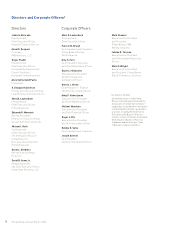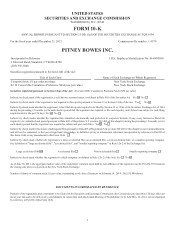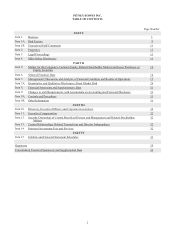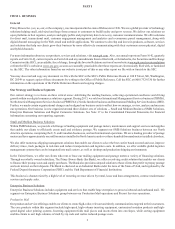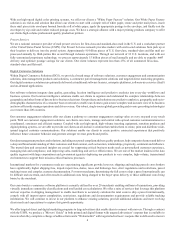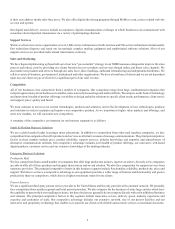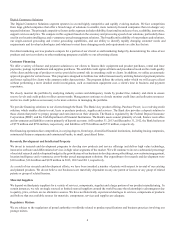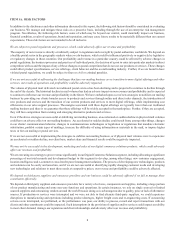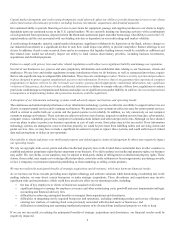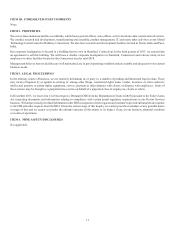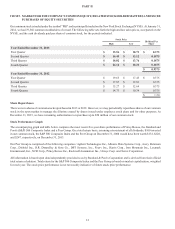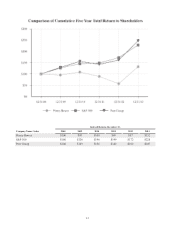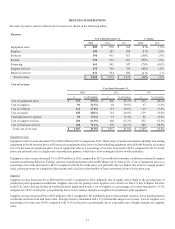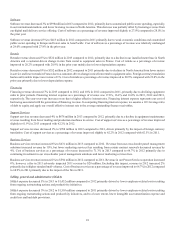Pitney Bowes 2013 Annual Report Download - page 20
Download and view the complete annual report
Please find page 20 of the 2013 Pitney Bowes annual report below. You can navigate through the pages in the report by either clicking on the pages listed below, or by using the keyword search tool below to find specific information within the annual report.9
Capital market disruptions and credit rating downgrades could adversely affect our ability to provide financing services to our clients
and to fund various discretionary priorities, including business investments, acquisitions and dividend payments.
Our continued ability to provide financing services to our clients for equipment, postage and supplies purchases to our clients is largely
dependent upon our continued access to the U.S. capital markets. We are currently funding our financing activities with a combination
of cash generated from operations, deposits held in the Bank and commercial paper and other borrowings. Our ability to access the U.S.
capital markets and the cost associated with our funding activities is dependent on our credit ratings and market volatility.
A credit ratings downgrade, material capital market disruptions, significant withdrawals by depositors at the Bank, adverse changes to
our industrial loan charter or a significant decline in cash flow could impact our ability to provide competitive finance offerings to our
clients. In addition, if such events occurred, there can be no assurance that liquidity funding sources would be available or sufficient and
that related costs would not adversely impact our ability to fund various discretionary priorities, including business investments,
acquisitions and dividend payments.
Failure to comply with privacy laws and other related regulations could subject us to significant liability and damage our reputation.
Several of our businesses use, process and store proprietary information and confidential data relating to our businesses, clients and
employees. Privacy laws and similar regulations in many jurisdictions where we do business, as well as contractual provisions, require
that we take significant steps to safeguard this information. These laws are continuing to evolve. We have security systems and procedures
in place designed to protect against unauthorized access to such information. However, there is no guarantee that experienced computer
programmers or hackers will not be able to breach our security systems and misappropriate confidential information. Any significant
violations of data privacy, disclosure of other confidential information or failure to comply with any of these laws, regulations or contract
provisions could damage our reputation and business and subject us to significant costs and/or liability. In addition, the cost and operational
consequences of implementing further data protection measures could be significant.
A disruption of our information technology systems could adversely impact our business and operating results.
The continuous and uninterrupted performance of our information technology systems is critical to our ability to support and service our
clients, to support postal services and to manage our business. We maintain secure systems to collect revenue for certain postal services,
which is critical to enable both our systems and the postal systems to run reliably. In addition, we rely extensively on our computer
systems to manage our business. These systems are subject to adverse acts of nature, targeted or random security breaches, cyber-attacks,
computer viruses, vandalism, power loss, computer or communications failures and other unexpected events. Although we have disaster
recovery plans in place to protect our business operations in case of such events, those plans may not be successful. If our information
technology systems are damaged or cease to function properly, we could be prevented from fulfilling orders and servicing clients and
postal services. Also, we may have to make a significant investment to repair or replace these systems, and could suffer loss of critical
data and interruptions or delays in our operations.
Our inability to obtain and protect our intellectual property and defend against claims of infringement by others may negatively impact
our operating results.
We rely on copyright, trade secret, patent and other intellectual property laws in the United States and similar laws in other countries to
establish and protect proprietary rights that are important to our business. If we fail to enforce our intellectual property rights, our business
may suffer. We, our clients, or our suppliers, may be subject to third-party claims of infringement on intellectual property rights. These
claims, if successful, may require us to redesign affected products, enter into costly settlement or license agreements, pay damage awards,
or face a temporary or permanent injunction prohibiting us from marketing or selling certain products.
We may not realize the anticipated benefits of strategic acquisitions and divestitures, which may harm our financial results.
As we increase our focus towards providing more digital technology and software solutions while maintaining a leadership role in the
mailing industry, we may divest certain businesses or make strategic acquisitions. These divestitures and acquisitions may involve
significant risks and uncertainties, which could have an adverse effect on our operating results, including:
• the loss of key employees or clients of businesses acquired or divested;
• significant charges to earnings for employee severance and other restructuring costs, goodwill and asset impairments and legal,
accounting and financial advisory fees;
• difficulties in achieving anticipated benefits or synergies from acquisitions and divestitures;
• difficulties in integrating newly acquired businesses and operations, including combining product and service offerings and
entering new markets, or reducing fixed costs previously associated with divested assets or businesses; and
• difficulties in identifying and separating intellectual property to be divested from intellectual property we wish to keep.
If we are not successful at realizing the anticipated benefits of strategic acquisitions and divestitures, our financial results could be
negatively impacted.


